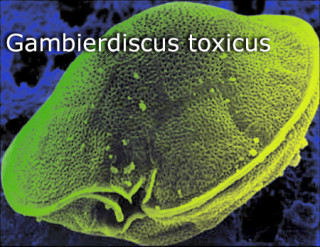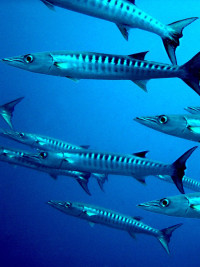I have been noticing a lot of chatter on the interwebs and in the media about the fish borne ailment ‘Ciguatera’. I don’t know if it’s data collection improvements, easier information access, media fear mongering, or rising ocean temps, but there seems to be more occurrences of Ciguatera poisoning. At first glance I didn’t think much of it, but the more I dug into it, the more I realized how wrong I was both in scope and severity.
Before I get too far into this post I need to make it abundantly clear I’m not a doctor or medical professional and I’m not trying to dispense medical advice. I’m just a sailor trying to understand my world and its potential threats so I can be prepared to deal with it.
I know I’m going to sound really dumb, but the first problem I had when researching this threat was how the hell do you pronounce it. I called a doctor friend of mine and made her say it over and over on the phone, till I got it. I’m kind of embarrassed by this so I thought an audio track would spare someone else that embarrassment. You can play it as many times as it takes, till you get it down.
Now that we’re all speaking the same language. What the hell is this toxin and why is it so bad. At first I was confused, the internet kept talking about dinoflagellates (e.g. Gambierdiscus toxicus 1) as the source. This made no sense to me, because that’s just a tiny plant/algae. Finally my mind made the connection the Ciguatera toxin is not the plant it’s actually a chemical compound secreted by these tiny widgets. The toxin is the real threat, not the plant. Holy crap, this stuff is akin to snake venom! It’s not a virus or bacterial agent it’s a chemical compound. To make matters even worse it’s odorless, tasteless, colorless and like Keith Richards cannot be killed by conventional weapons like cooking or freezing and there’s no method of detection outside a lab 2. UGH!!!
Wrapping my head around the fact that Ciguatera is a chemical compound made everything fall into place. Like heavy metals and pesticides, if it cannot be metabolized and flushed from the host, it will accumulate and climb the food chain till it gets to us humans. At that point, toxicity’s main variable, ‘quantity’ comes into play as we eat large reef predators. These predators who have by transitive properties possibly eaten 1000’s of small herbivorous infected fish, have the potential of being highly contaminated and just waiting for us to catch and eat them.
Now it’s starting to make sense. A tiny little plant that likes warm water and sunshine hanging out with Nemo on coral reefs produces a toxin when eaten by small herbivorous fish. Who then get eaten by progressively larger fish till it gets to the game fish we catch and eat it. By that time the toxin has gotten to the level of concentration where it’s high enough that our normal bodily functions cannot handle it and therefore toxic and makes us sick!
You would think okay so why don’t the contaminated fish get sick and die off. Seems mother nature is not without a sense of humor. It looks like fish are somewhat immune to the toxin. Mammals, like you and me, on the other hand, are not 3, yay us!
What type of fish do I need to avoid? Many sites produced a list of suspect fish to avoid. California public health says to stay away from large predatory fish, greater than 6lbs 4. But I found other variables that also play a role in this crap shoot: water temp, algae blooms, currents, season, etc. In short, there really isn’t a hard and fast rule of which fish to avoid. With that said, I did collate a list from all the sites I researched of the suspicious fish species to be leery of:
- Barracuda
- Black Grouper
- Blackfin Snapper
- Cubera Snapper
- Dog Snapper
- Greater Amberjack
- Hogfish
- Horse-eye Jack
- King Mackerel
- Yellowfin Grouper
- Parrot Fish
- Trigger Fish
- Sea Bass
- Moray Eel
Lets say you’ve slipped up and got Ciguetera poisoning. What do you do now? This is where I have to be very careful and reiterate I’m not a medical professional and I’m not dispensing medical advice. If you can, get to a doctor and follow their directions. If you’re at sea and days away from help. The prevailing advice I’ve read on the internet 5, as limited as it is, is to treat it like a bad case of the flu: stay hydrated, take an anti-inflaminatory, get as much rest as you can, keep your stress low. If things don’t improve in a couple of days seek medical advice. Be ready to give your doctor information about the type of fish you suspect that made you ill, when you ingested it, and where it came from.
Ciguatera toxin seems to be fat soluble 6 so avoid alcohol, fish, nuts, and nut oils after exposure, they may trigger recurrent symptoms. Even though I read multiple instance about it being lipid/fat soluble no one said anything about avoiding dairy and eggs. Not sure why that was, but you might want to error on the side of caution and add them to your list.
Even if you do go to the doctor be aware at this time there is no known cure for Ciguatera poisoning. A medical facility can relieve the symptoms and keep secondary problems at bay, but they don’t have an antitoxin or cure for the ailment. Recovery will be left up to your own body’s defense mechanisms.
Don’t get too spooked by all this doom and gloom. The good news is that Ciguatera poisoning is rarely fatal 7. Usually it’s a couple of days of ailment then a slow recovery similar to the flu. So we’ve got that goin for us,…… which is nice. 8

Normally I’d have a supporting image here, since we’re talking human ailments, I’m just going to post a cute kitten…
Another frustration I ran into was the symptoms of Ciguatera poisoning . There were a lot of lists like the one below. However as far as I can tell they’ve just cataloged every possible human physiological abnormality.
- nausea
- vomiting
- diarrhea
- numbness or tingling,
- muscle aches,
- headaches,
- dizziness,
- hallucinations
- weakness
- fatigue
- irregular heart rhythm,
- low blood pressure.
- Reverse temperature sensation hot=cold, cold=hot
Oh and check this out! I ran into a news article stating that the United States has a little seafood labeling problem 9. As much as 30% of the seafood sold in the united states could be mislabeled. You could be sitting in Topeka Kansas, about as far from the ocean as one can get, and still get Ciguatera poisoning. That expensive flounder you ate at the local fancy-shmancy seafood restaurant was actually snapper or grouper. Nowhere is safe from this stuff.
To sum things up; I can’t tell you how frustrating it has been researching this topic. Even after multiple days of internet research and talking to my doctor friends I feel completely vulnerable. Since you can get infected anywhere in the world. The only advice I can come up with is “The Best defense is a good offense!” be diligent about the fish you eat: size, species, where it was caught, time of year, who’s selling, etc. Do your best to be informed and try to avoid the bugger. If you do get it, find a doctor and follow their instructions, don’t freak out, rest and recoup!
Cheers,
Island Rambler
P.S. If you want to do your own research, which I highly recommend, I have noted many of the resources from my own research, you can use them as a starting point.
Notes:
- Gambierdiscus toxicus ↩
- There is a company in Hawaii that makes a test kit called Cigua-Check, but I couldn’t find a retailer anywhere. ↩
- www.emidicehealth.com ↩
- Califonia Department of Public Health ↩
- www.emedicinehealth.com ↩
- Woods Hole Oceanographic Institution ↩
- Food And Agriculture Organization of the United Nations ↩
- Carl Spackler -Caddyshack ↩
- Washington Post ↩










